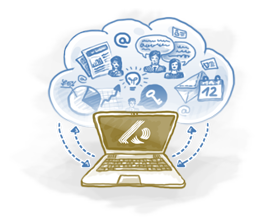With regard to a CRM solution, it is a question on the minds of many businesses these days: should we move to cloud CRM, or “stay on the ground?” What would be the benefits? What are the risks? Is it safe? Is it cost-effective? Will it impact our sales process and pipeline management?
 Cloud CRM Is the Driver
Cloud CRM Is the Driver
It is interesting that research has found that the decision for a business to move IT operations to the cloud centers around CRM—primarily because prospect and customer information comprises much of the data storage for a large number of companies. McKinsey & Company, a leading global strategic management consulting firm, found in 2011 that the number one application that CIOs would be moving to the cloud would be CRM. Research by Gartner Group revealed that, in 2012, 40 percent of CRM systems sold were cloud-based, and sales of CRM software increased by 12 percent; this is three times the average of all enterprise software categories.
It can also be seen from research that the general move to the cloud and especially cloud CRM for overall business is definitely strong and only gaining momentum. Cisco Systems—through its Global Cloud Index, an ongoing effort to forecast the growth of global data center and cloud-based IP traffic—projects that 51 percent of corporate workloads will be handled in the cloud in 2014 and that by 2017 that figure is expected a rise to 63 percent. Cisco is also predicting that by 2017 cloud traffic will account for 69 percent of total data traffic, as compared to 46 percent in 2012.
Making the Decision
A company deciding whether or not to move CRM—and overall IT operations—to the cloud has a number of issues to evaluate. To start with, there are several cloud computing models to choose from. A private cloud means your company is leasing facilities for your company’s exclusive use; a public cloud model means that you are sharing resources with others; a hybrid cloud is a combination. There are other variations of models available as well, depending on your company’s requirements.
Another basic choice to be made is regarding the applications that your company will be accessed through the cloud. Should applications be purchased outright, as has always been done, or should you move over to a subscription, SaaS (Software as a Service) model?
Throughout the decision-making process about moving to the cloud CRM, security aspect has to be properly evaluated. You and your staff will have any questions regarding the security of systems and data; cost benefits or risks of cloud computing; service performance and uptime; technical support; transference of your data to the cloud; scalability; multi-device assess and more.
As with any decision that will have a long-term impact on company operations, your move to the cloud should be made with care. This is not the time for assumptions; make sure to fully research your requirements for cloud computing. Once you have done so, then take the time to research all the options available. Get all of your questions answered.
SMBs and Cloud CRM
While cloud computing can be found to have substantial advantages for any business and sales pipeline management of any scale, SMBs (small to medium businesses) can especially benefit. A large corporation, with a multi-million dollar IT budget, may have somewhat of a problem deciding if cloud computing and a cloud CRM solution is right for it; it can comfortably afford on-site server farms and a hefty IT staff. A smaller business, on the other hand, is usually operating on a tight budget and to maintain in-house the facilities that cloud computing could bring to it.
Hence it can be seen that there is much to learn. In this series of articles on cloud CRM, we’re going to weigh the pros and cons, as well as explore myths and realities of moving to the cloud.
How could a cloud CRM solution benefit your company? Find out by signing up for one of our free webinars.




















